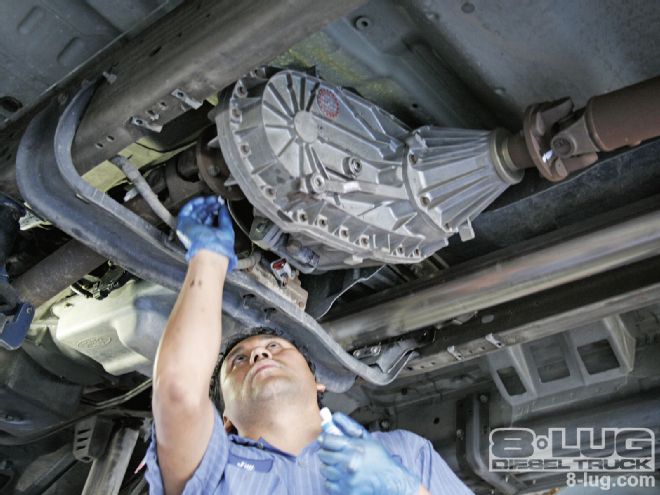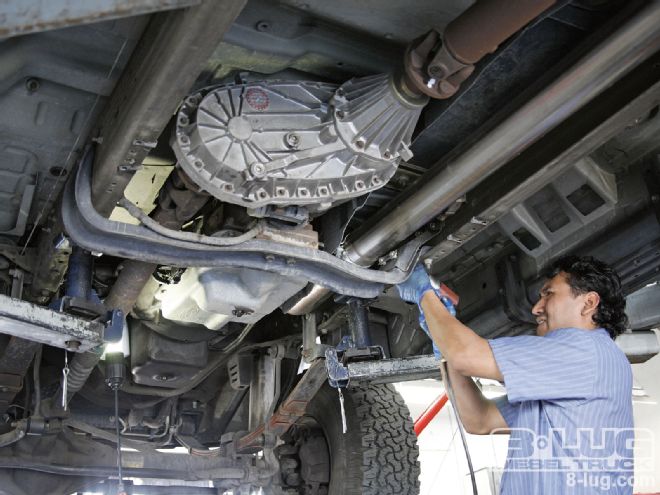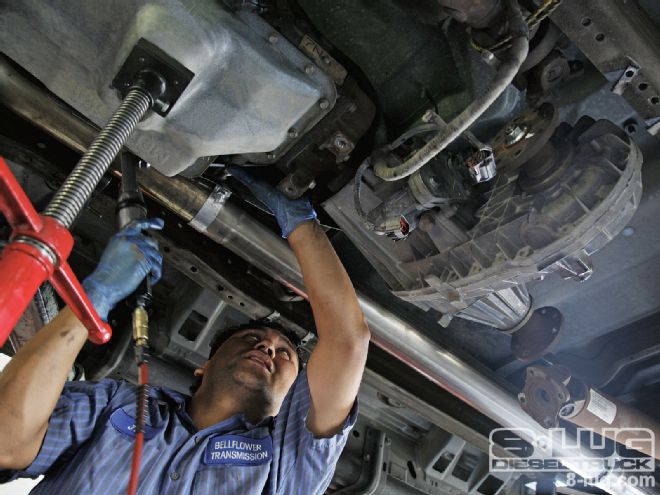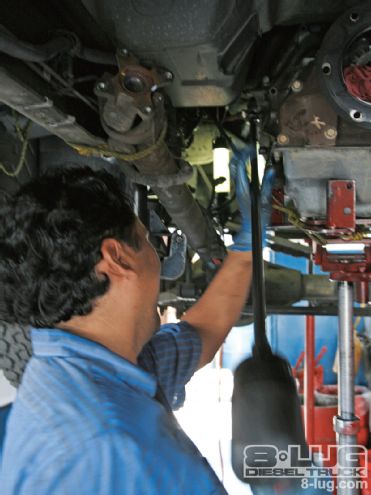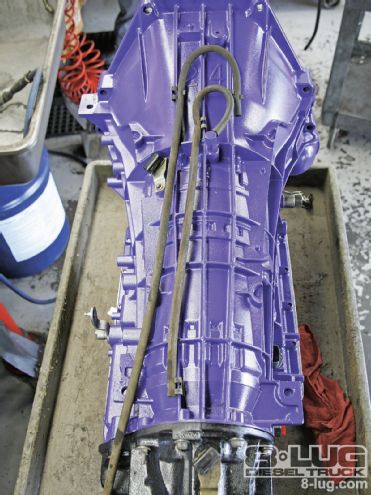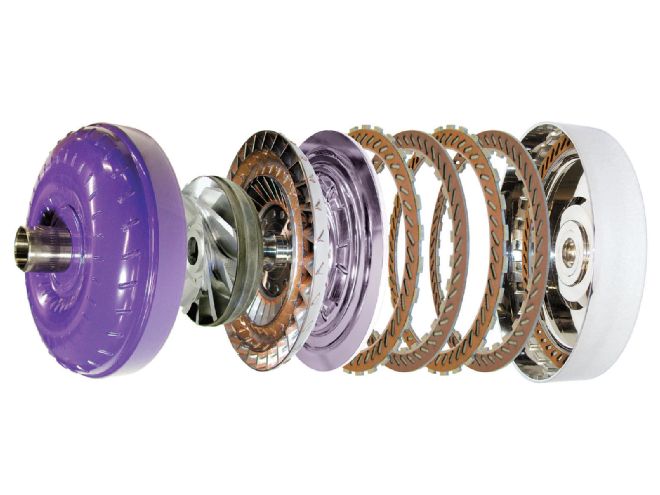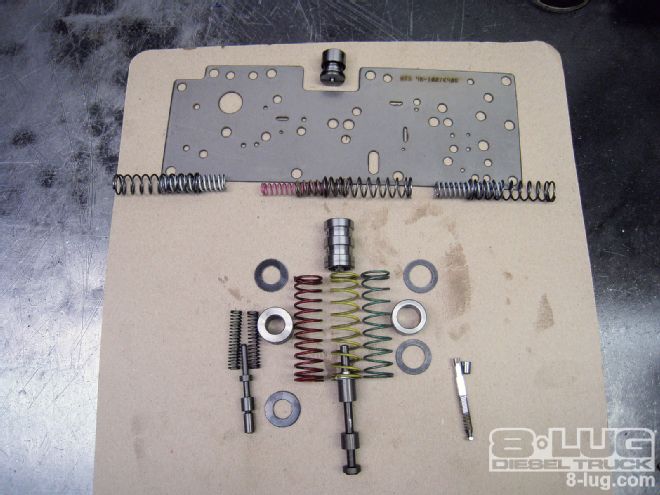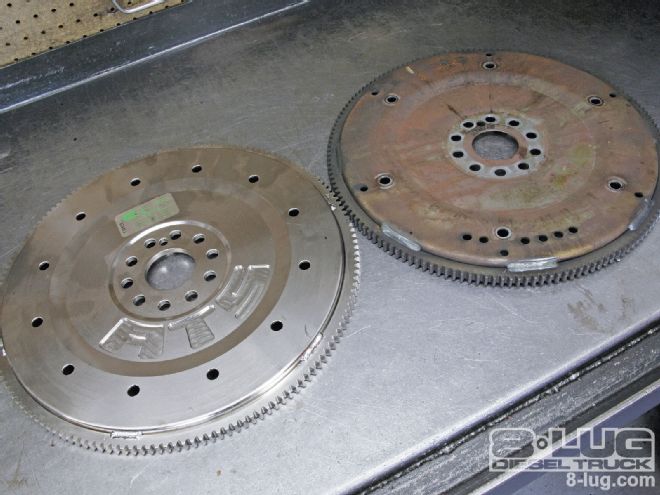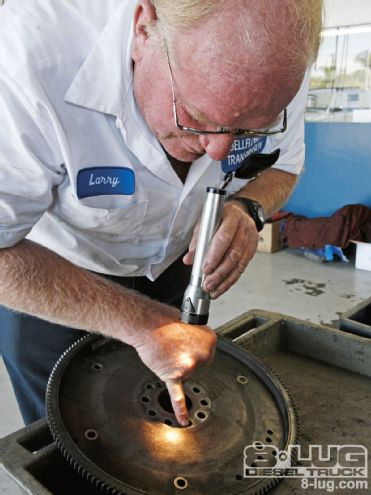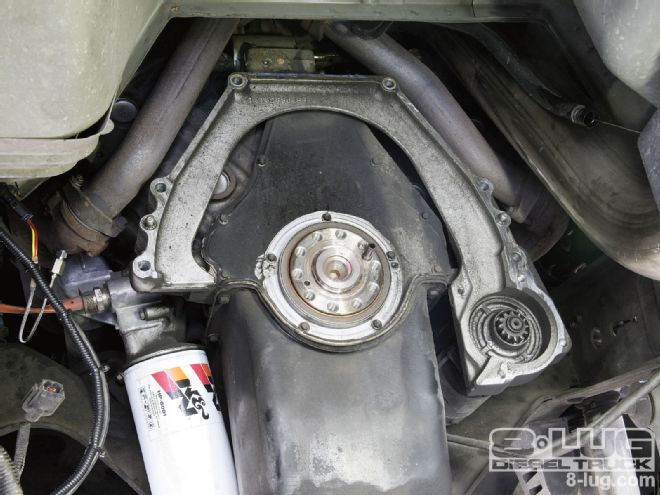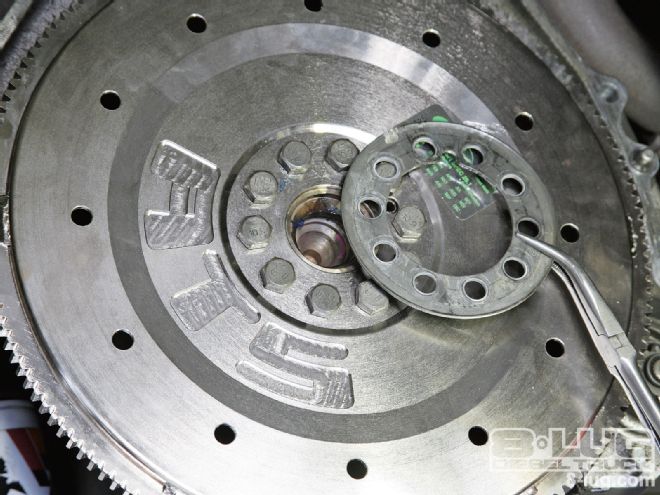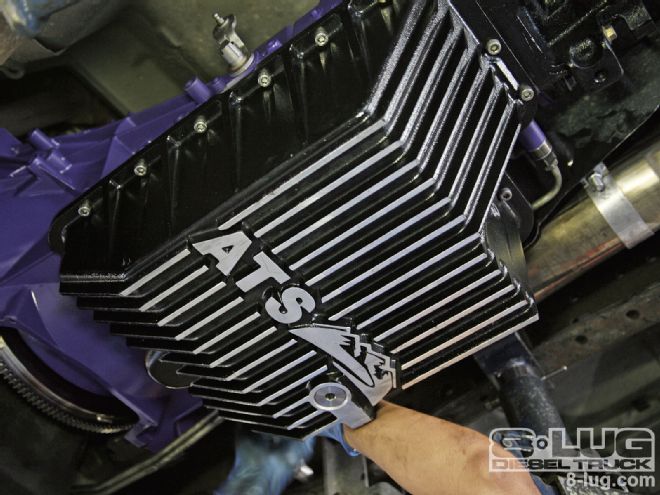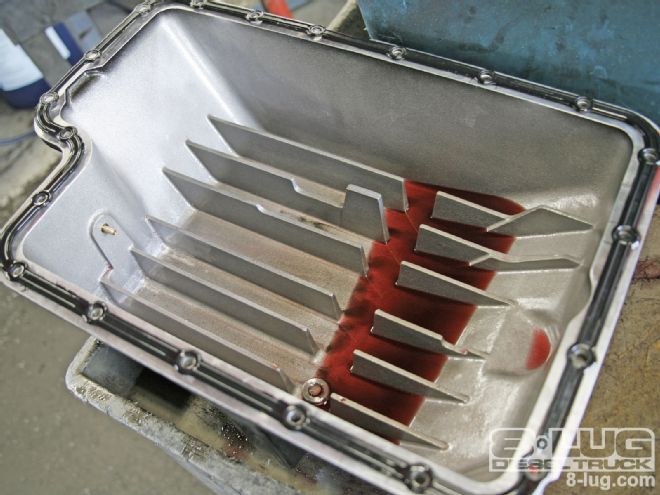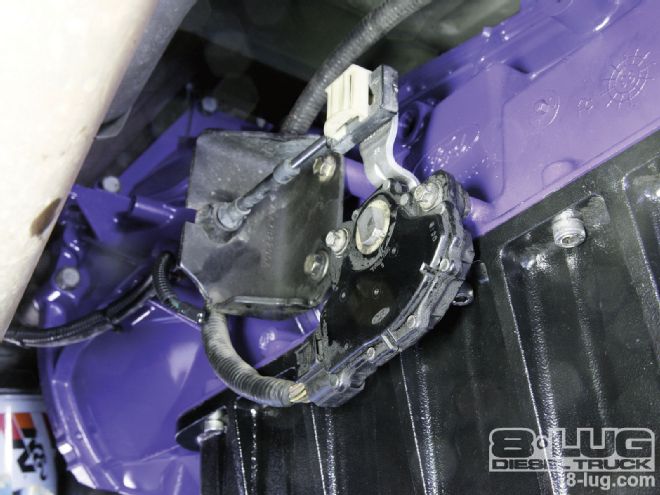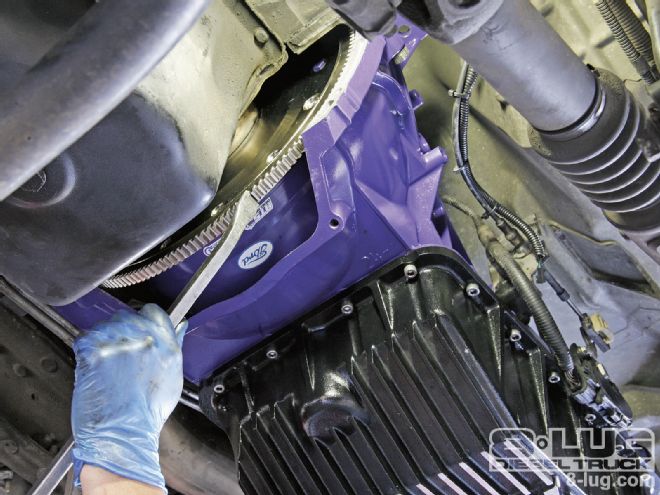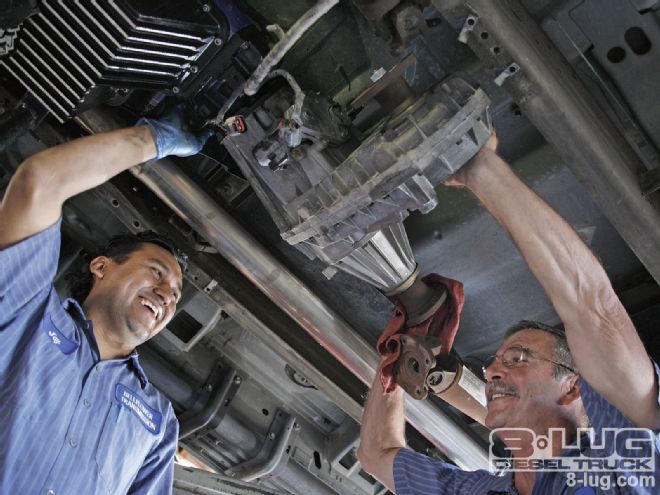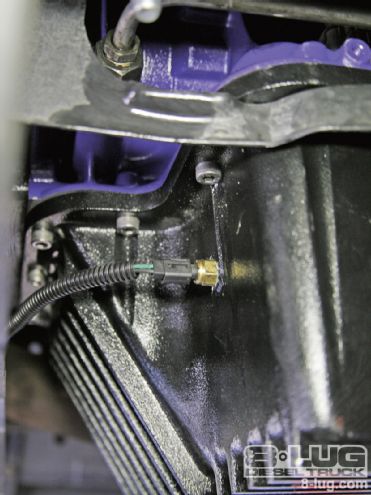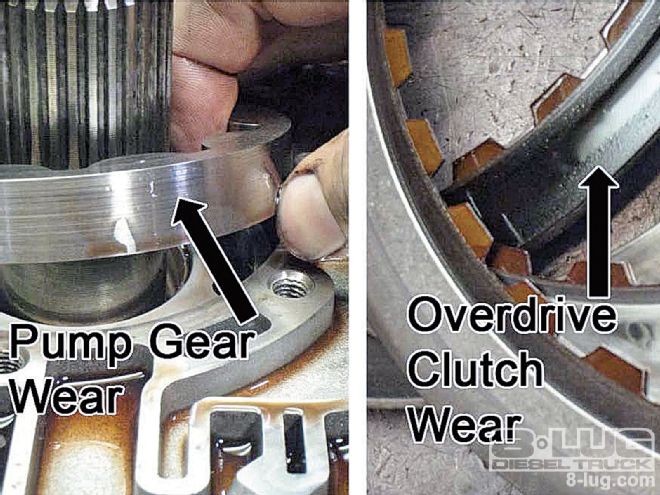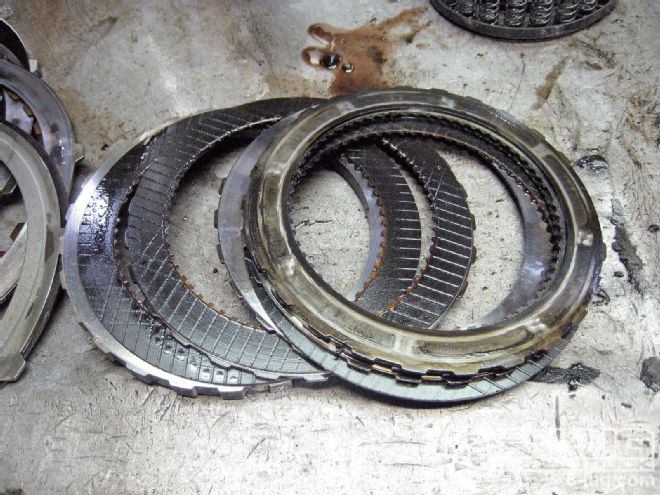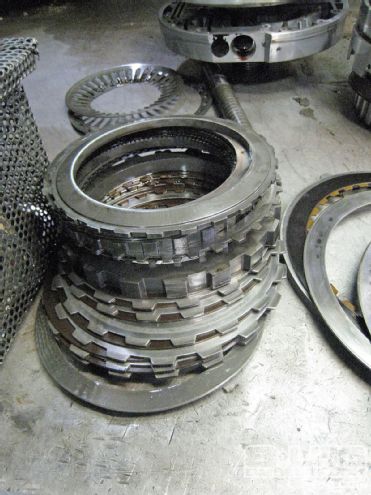Ford's 7.3L Power Stroke engines are known for easily racking up 300,000 miles or more with proper maintenance, and that's one of the reasons we sought one out for a long-term, usable project truck. The trannies, however, are typically not inclined toward the same kind of longevity-especially under heavy use.

| Purple's a manly color when we're talking about ATS Diesel Performance equipment. Every tranny is dyno'd on a triple-turbocharged, 500-plus-hp, 1,200-lb-ft race engine before it leaves the shop.
Heavy use, of course, is sort of a broad term, since as far as a transmission is concerned, towing, hauling, off-roading, adding bigger wheels and tires, and even hopping up the engine all translate to extra strain. How long a trans will go and how much abuse it'll take depends completely on how it's used, how it's driven, and how it's cared for. We've seen guys have to get rebuilds way before 100K miles, and we've seen stock trucks still towing well into the 200K range. Hard to say what causes the disparity, but it's something we kept in mind while mapping out our build plans, because if there is a weak link to be found on early Super Duty Fords, it's the stock 4R100.
Naturally, throwing increased horsepower and torque into the equation nullifies all previous life expectancy estimates-partly because of those impossible-to-resist pedal slams. Consequently, there's no real answer as to exactly what power level any trans will start to slip at, but it is safe to say that in stock form you're tickling the upper limit on a 4R100 (and most other stock truck transmissions) at around 400 hp and 650 lb-ft-even with conservative driving. Those power levels are attainable with the right bolt-ons and programming on any turbodiesel engine from the Big Three, which means we're well on our way to taking out our well-worn trans.

| Our big, black F-350 project went on the rack at Bellflower Transmission (562/867-5240) in Bellflower, California, for certified professional assistance with the tranny swap, since we wanted full warranty protection, and because we're not fond of solo wrestling with 400-pound transmissions.
Though most of the mileage was racked up by the previous owner, we do know that in its past life, our F-350 project truck made quite a few runs up the long hills into Lake Tahoe hauling a big fifth-wheel trailer. With 183K on the original 4R100 and no previous work performed (and no trans temp gauge installed), we figured we must have lucked into one that was built on a good day. We knew we were tiptoeing further into borrowed time each time we loaded up the truck and romped on the pedal...or bolted on a new performance part.
There is bad news here, however. To be perfectly honest, no quality heavy-duty diesel transmission rebuild is cheap, and in our experience, the cheap ones will always cost you more down the road. There are several things to consider when it comes to what type of build to pursue and how much to spend on your truck, but it really all boils down to three points: How hard are you going to use it, how much are you going to modify it, and how long are you going to keep it?

| After draining the fluid from the pan, Bellflower Transmission's Jaydon Miranda removed the six bolts holding the inspection cover in place to drain the torque converter. Can you believe we got so lucky with the plug position? Jaydon also removed the nuts securing the torque converter to the flywheel by rotating the assembly with a small prybar pressed against the flywheel teeth.
In our case, we're building a reasonably modified keeper that'll be used regularly for light to moderate hauling, so our decision centers on how far we can expect our dollar to go. Basically, we want it all: a tough trans that will handle anything we can throw at it and do so for many years-preferably with a long warranty that guarantees it. Transmissions aren't fun to play with, so we want to install it and forget about it.
At any rate, considering the mileage, we knew we were looking at a complete overhaul and thorough upgrade of our existing trans to bring it up to snuff. But we really couldn't afford the expected downtime of a standard rebuild, so we searched for turnkey trannies that met our criteria and could be swapped in a day. There are actually several companies that provide ready-to-go severe-duty transmissions for powerful diesel pickups, but when it comes to warranty, no one we spoke to could hold a candle to the 5-year, 500,000-mile warranty ATS Diesel Performance slaps on all of its transmissions. Seriously, try calling around to a few businesses to see if they'll match it. We did-we got a few flat "no" responses, a few laughs, and one guy just hung up on us.

| One of the big reasons the ATS trans is so effective is the Five Star Viskus Clutch Drive torque converter. This unique 85-pound billet converter (vs. the stock 35-lb'er) uses ATS' fluid-assist technology that results in much less parasitic loss. That translates into more engine power transferred through the converter and to the wheels, quicker turbo spool up, less heat, and better fuel economy. The extremely strong billet casing also prevents converter swelling under strain and load and will not warp with extended heat cycles.
We like doing things on our own, but for this installation we sought out assistance from Bellflower Transmission in Bellflower, California, for a couple of reasons. First, this isn't a driveway swap for most people, considering the size and considerable weight of a transfer case and 4R100-unless you're experienced and have a well-equipped garage. Secondly, even if you're positive you're up to the task, installation by an ATS-certified shop is required by ATS to receive the full product warranty. Since that was one of our major justifications for choosing the trans, it just doesn't make sense to compromise it.
As the owner of the only ATS-certified shop in the Los Angeles area, Larry Van Otterloo and his crew see a lot of expensive, powerful, and occasionally overdone trucks. Larry claims our truck fits his description of his favorite project: a conservative-looking truck with modifications that allow it to be more enjoyable to drive, work harder, and be depended on for many years. He's even got a name for such trucks: Old Soldiers. Thanks to Bellflower's experience and professionalism, we were in and out in a day, and we think we now have a name for our F-350 project truck.
Tranny Review
Honestly, we really didn't think the original trans was all that bad-until we drove the truck with the new ATS installed. The difference was immediately noticeable; acceleration was quicker, shifts were dramatically faster without being harsh, and boost built more quickly. We hadn't done a thing to increase horsepower or torque, but we were feeling more of what we already had thanks to much more efficient power transfer, and less parasitic loss. The specific valvebody tuning in the trans, tighter clutch pack tolerances, and the Five Star torque converter's lower stall speed gave quicker pickup and more torque off idle. Plus, the Co-Pilot's command of converter lock-up under hard throttle made our 4R100 feel like a six-speed-without the stick throwing. The difference was even more noticeable when pulling a trailer, since the 7.3L's torque was going to the wheels rather than up in heat through slippage. Consequently, trans fluid temps never rose above 175 degrees. We'd have to say, this swap made our aged driveline feel fresher than any previous part.

| We've wrestled many transmissions in the driveway over the years, but trust us-a transmission jack is the only safe way to lift this bad boy into place since the transfer case and fluid of the ATS 4R100 tips the scale around 400 pounds.
The Tranny Autopsy
Typically, once you send your old trans in as a core, that's the last you'll ever see of it. However, we felt such a difference in our truck, we had to find out if the ATS trans was just a marvel of efficiency or if we were riding around with a ticking time bomb that was robbing us of rear-wheel power. We asked ATS to perform an autopsy on our stock trans and diagnose its ills. We were surprised to learn that this is actually a standard practice around the shop that ATS refers to as Failure Analysis. Thanks to a few photos the crew sent back, we were able to see that our intuition about our trans not being long for the road without more power being funneled through, was well founded.
